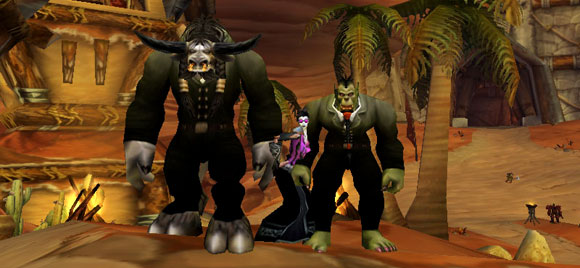Recently, I have been introducing myself to the variety of fields that are often included in the interdisciplinary area and related subjects of game studies. Of all these assembled disciplines, psychology has shown itself to be rather pervasive and useful, joining ethnography and human-computer interaction in a trio of methods with which I intend to study player behavior and social capital as I move into my PhD work. As Massively Multiplayer Online Role Playing Games (MMORPGs) are my current medium of choice, I want to use this blog entry to highlight some of the active topics of research in that sphere. In aiming to keep this post to a manageable size, I'll focus on the concepts of social capital, trust, and motivation.

Social Capital, Bridging, and Bonding
According to a 2008 report by the China Internet Network Information Center (CNNIC), there are over 147 million Chinese people playing online games, 53% of which are MMORPGs.
World of Warcraft alone hit a peak subscription count of 12 million active subscriptions, which begs the questions of how online social interaction differs from its offline counterpart.
Researchers have pursued answers to this question for years, and studies such as Zhong (2011) out of Guangzhou's Sun Yat-Sen University have shown that there are several interesting relationships between online and offline socialization. This and other studies have corroborated findings that online collective play have highly significant positive effects on offline civic engagement, and various online social structures can grant enhanced skills in social bridging and bonding. The concept of the gamer as largely anti-social is fading as more studies surface, and it's no surprise that MMORPGs and online-enabled games are the big focuses for this era of game development. New titles such as
Destiny are releasing to audiences of over nine million active users, and games rarely lack some form of online-enabled social design. As a result, online interaction is one of the hottest topics of study.
Trust and Truthfulness
One of the subsets of online interaction is the concept of trusting another individual or trusting in your social structure, whether these are players, guilds, or even entire factions. As Shen et al. (2010) note in their paper entitled "Schmoozing and Smiting", trust is not only a vital element of social interaction and healthy relationships, but one that is radically shifting in the information age. Traditionally, the structures that work to establish and build trust were found in social institutions and societies at large. According to Giddens (1991) however, trust today is more a product of personal, individual interactions and commitments. This is largely due to the removal of unions, clans, and the concept of the neighborhood, thus leaving people to fend for themselves in society at large. This is not dissimilar to how MMORPG socialization functions, as frequently an individual player must work their way through the online world alone, with the only existing social structures being guilds and player cliques. This is a relatively literature-light section of games research, but one that is rapidly becoming a hot topic as social design affixes itself as a required element in video games.
Motivation and Commitment
Motivation is one of the key starting points for understanding the psychology of MMORPG players, and as such there have been a number of suggested archetypes for these individuals. Nick Yee in particular, whose
Daedalus Project sought to compile a broad range of research into the psychology of these online games, sought to define these player types. One of his most circulated works is titled
Motivations for Play in Online Games, and asserts that there are a large number of these motivating factors which group into three categories: achievement, social, and immersion.
While I won't go into detail in the various elements of these player archetypes, many interesting motivations (and areas for study) exist in his model, such as optimization of characters, escapism, discovery, and provocation. This is a particularly relevant area of study for a reason that Yee states quite nicely at the end of the paper, asserting that while grouping people into "mmo players" may be nice for making sweeping generalizations about behavioral issues such as deviance and addiction, it fails to take into account that people play MMORPGs for a variety of reasons.
These reasons and their resultant effects on player behavior and social interaction are certainly a hot topic in game studies, and I would argue that they are the root of many research inquiries in the future.
I hope you found this to be an interesting look into the psychology of player behavior in MMORPGs, and that this piques your interest the subject! These are three areas that I have found to be frequently represented in critical discussion, and they are certainly things I will be exploring in my own studies of online games. My next entry will take a more personal look into the actions and social groups of players in these spaces, as I look at the field of ethnography and the cultures to be found in spaces such as
Everquest, World of Warcraft, and
ArcheAge.


